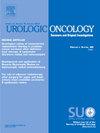扩大睾丸癌患者(p)康复的作用
IF 2.4
3区 医学
Q3 ONCOLOGY
Urologic Oncology-seminars and Original Investigations
Pub Date : 2025-03-01
DOI:10.1016/j.urolonc.2024.12.093
引用次数: 0
摘要
关于向睾丸癌(TC)患者及其护理人员提供营养、运动和心理支持的最佳实践数据很少。我们的目的是总结现有的文献并找出差距。方法:我们进行了一项范围综述,包括随机对照试验(rct),其中包括(p)康复、运动、心理支持或营养成分的项目中的TC患者或其护理人员。记录的阳性(SS+)和阴性(SS-)结果均有统计学意义,差异无统计学意义(NSD)。结果系统检索得到10,968条记录,包括14个独特的rct,包含1729个独特的受试者,其中250个为TC患者/幸存者,0个为护理人员。总体而言,9/14(64%)的rct结果≥1 SS+, 4例为NSD, 2例为1 SS-。在评估双峰运动和心理支持的3项随机对照试验中,3项获得≥1 SS+,相比之下,3/4提供单峰心理支持,0/1提供单峰营养支持,3/6提供单峰运动方案,尽管有2项显示出负相关(增加血栓事件和疲劳)。表1展示了纳入的随机对照试验的特征,而图2是一个冲积图,描述了纳入的随机对照试验采用的干预类型以及受影响的结果。结论:超过一半的TC (p)康复随机对照试验显示对≥1个感兴趣的结果有效。这些干预措施是安全的,积极的结果超过了两项有SS结果的随机对照试验。有特别有力的证据支持运动改善疲劳、心血管风险、身体表现指标,包括最大摄氧量、肌肉力量等,以及改善疲劳和心理健康的心理支持计划。这方面的数据缺乏,需要进一步开展工作。本文章由计算机程序翻译,如有差异,请以英文原文为准。
EXPANDING THE ROLE FOR (P)REHABILITATION FOR PATIENTS WITH TESTICULAR CANCER
Introduction
Few data exist on best practices for provision of nutrition, exercise, and psychologic support to testicular cancer (TC) patients and their caregivers. We aim to summarize the extant literature and identify gaps.
Methods
We performed a scoping review including randomized controlled trials (RCTs) including patients with TC or their caregivers in a program with (p)rehabilitation, exercise, psychologic support, or nutrition components. Recorded were statistically significant positive (SS+) and negative (SS-) results and nonsignificant differences (NSD).
Results
The systematic search yielded 10,968 records, and included were 14 unique RCTs, encompassing 1729 unique subjects, 250 of which were TC patients/survivors, and 0 of which were caregivers. Overall, 9/14 RCTs (64%) yielded ≥1 SS+ while four demonstrated NSD, and 2 demonstrated one SS- each. Of 3 RCTs evaluating bimodal exercise and psychologic support, 3 yielded ≥1 SS+, compared with 3/4 providing unimodal psychologic support, 0/1 providing unimodal nutritional support, and 3/6 interventions providing unimodal exercise programs, though two demonstrated negative associations (increased thrombotic events and fatigue). Table 1 demonstrates characteristics of included RCTs, while Figure 2 is an alluvial diagram depicting the types of interventions emplyed by included RCTs along with outcomes affected.
Conclusions
Over half of RCTs on TC (p) rehabilitation demonstrate efficacy for ≥1 outcome of interest. Such interventions are safe, with positive findings outweighing the two RCTs with SS- findings. There is particularly strong evidence to support exercise improving fatigue, cardiovascular risk profile, and physical performance measures including VO2 max, muscle strength, etc. as well as psychologic support programs to improve fatigue and mental health. A paucity of data exists in this space and further work is needed.
求助全文
通过发布文献求助,成功后即可免费获取论文全文。
去求助
来源期刊
CiteScore
4.80
自引率
3.70%
发文量
297
审稿时长
7.6 weeks
期刊介绍:
Urologic Oncology: Seminars and Original Investigations is the official journal of the Society of Urologic Oncology. The journal publishes practical, timely, and relevant clinical and basic science research articles which address any aspect of urologic oncology. Each issue comprises original research, news and topics, survey articles providing short commentaries on other important articles in the urologic oncology literature, and reviews including an in-depth Seminar examining a specific clinical dilemma. The journal periodically publishes supplement issues devoted to areas of current interest to the urologic oncology community. Articles published are of interest to researchers and the clinicians involved in the practice of urologic oncology including urologists, oncologists, and radiologists.

 求助内容:
求助内容: 应助结果提醒方式:
应助结果提醒方式:


